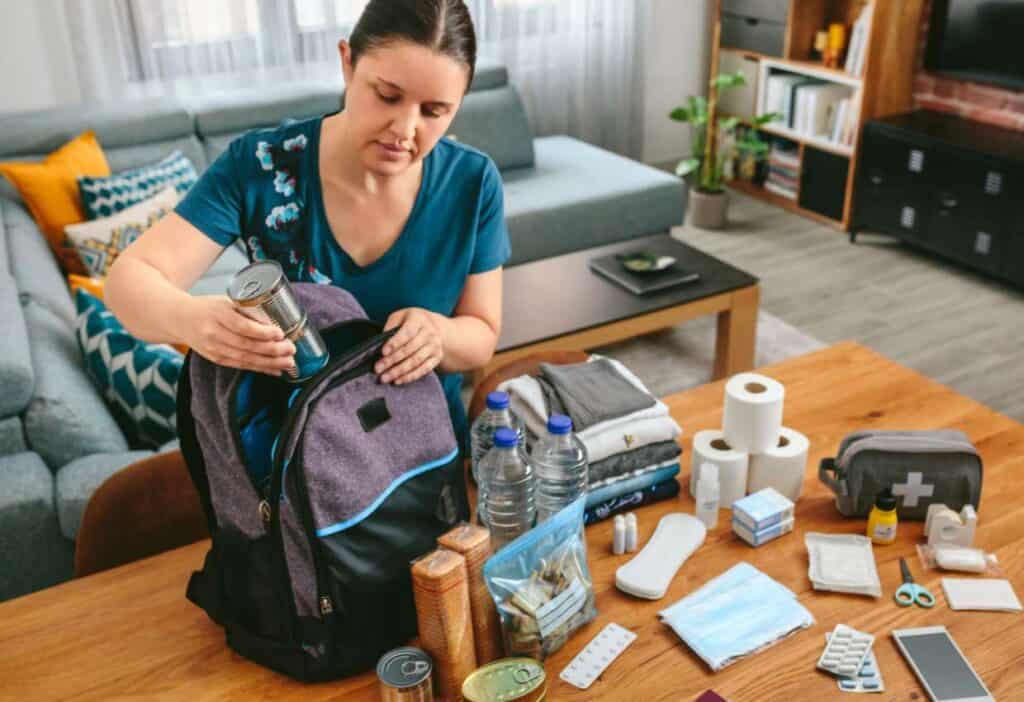When disaster strikes, having a well-prepared go bag can save precious time and reduce the stress of the situation. Here’s a quick guide to packing your summer go bag so you and your loved ones are ready to face any emergency.

Go bag basics
A go bag is packed with essential items to help you survive in the first three days of an emergency, should you and your family need to evacuate your home. Each family member, including pets, should have a go bag tailored to their specific needs. This ensures that everyone has the essentials they need in case of separation.
Set a schedule to check your go bags every six months to replace expired items and update personal documents. And remember to adjust summer-specific items seasonally.
Customize for each family member
Customize each bag based on individual needs. When packing each go bag, consider allergies, dietary restrictions and personal preferences. Think about what’s needed during the summer months, when wildfires, hurricanes, tornadoes and summer storms can force families and individuals to evacuate their homes at a moment’s notice.
Supplies for 72 hours
When outfitting a summer go bag, start with the basics. Each go bag should contain enough supplies to last at least 72 hours for each family member.
Food and water
Ensure you pack at least 1 gallon of water per person per day, covering both drinking and sanitation needs. Opt for non-perishable, high-energy foods that don’t need refrigeration, preparation or cooking, such as dehydrated foods. Pack protein bars, dried meats such as chicken jerky, dried fruits, nuts and canned goods with a manual can opener.
“I recommend packing enough food in your go bag to last at least three days,” says Christian Schauf, emergency preparedness expert and CEO/Founder of Uncharted Supply Co., which makes durable, practical survival gear to prepare anyone for any emergency. “Since you won’t have endless room for a feast, you should include dense, small packages of food rations.”
Bedding, bathing and clothing
Since it’s summer, pack lightweight clothing and a jacket or sweatshirt for cooler nights. Remember to pack sturdy shoes, too.
Pack compact sleeping bags or blankets for each family member. Include personal hygiene items such as soap, hand sanitizer, toothbrushes, toothpaste and feminine hygiene products. Don’t forget sanitation supplies like toilet paper, garbage bags and plastic ties.
Wet wipes or baby wipes may also be useful. Pack a multipurpose tool and a reliable flashlight with extra batteries. Alternatively, consider including a hand-crank flashlight.
First aid supplies
Your first aid kit should include bandages, antiseptic wipes, scissors, tweezers, pain relievers and prescription medications. And check to make sure you have an adequate supply of necessary prescriptions, including those for pets.
If summer emergencies in your areas include wildfires, you may want to include one more item. “You can only survive for three minutes without clean air, and with wildfires becoming increasingly common throughout the U.S. during the summer months, I’d highly recommend investing in a quality air filtration mask to pack in your go bag,” says Schauf. He suggests looking for one that provides 99.9% filtration of particulates to keep you breathing well until you can access clean air.
Documents and contacts
In an emergency, quick access to crucial documents and tools saves time and effort in providing necessary information to authorities. Your emergency pack should Include copies of identification such as driver’s licenses and passports, as well as medical records and insurance policies. Also pack a list of emergency contacts, including family members, doctors and local emergency services.
Communication tools and currency
Staying informed and connected during an emergency is critical. A battery-powered or hand-crank radio can provide up-to-date information on an emergency.
Include a portable charger or solar-powered charger to keep your cell phone operational. If you live in a remote or rural area without cell service, look for off-grid communication options.
Sometimes, simple, old-fashioned tools work best. If you become trapped or need to draw attention, use a whistle to signal for help. If GPS becomes unavailable, use a local map to navigate to safety.
In an emergency, ATMs and card readers might not be accessible. So pack small bills and coins for essential purchases.
Go bags for kids and pets
Pets and children have unique needs that require special attention when preparing a go bag. Pack enough food and water for each pet for at least three days, along with bowls, leashes, collars and any medications. A favorite toy or blanket can help reduce your pet’s stress during an evacuation.
For children, include items that provide comfort and distraction, such as stuffed animals, small toys or books. If your family includes a baby, pack diapers, wipes, formula, bottles and baby food, ensuring enough for several days.
Maintain your summer go bag
Creating a go bag is not a one-time task. Regularly check and update the contents to confirm everything is in working order and not expired.
Being prepared can save lives. A well-packed go bag tailored to the summer months and your family’s specific needs, including pets, is a crucial part of emergency preparedness.
Ensure you have enough supplies for at least 72 hours, and remember to pack essential documents, tools and personal items. Regularly updating and checking your go bag ensures you’re always ready for the unexpected. By taking these steps, you can provide your family with the security and peace of mind needed to navigate any emergency.
Sarita Harbour is a long-time business and finance writer. She created An Off Grid Life to help people become more self-reliant.